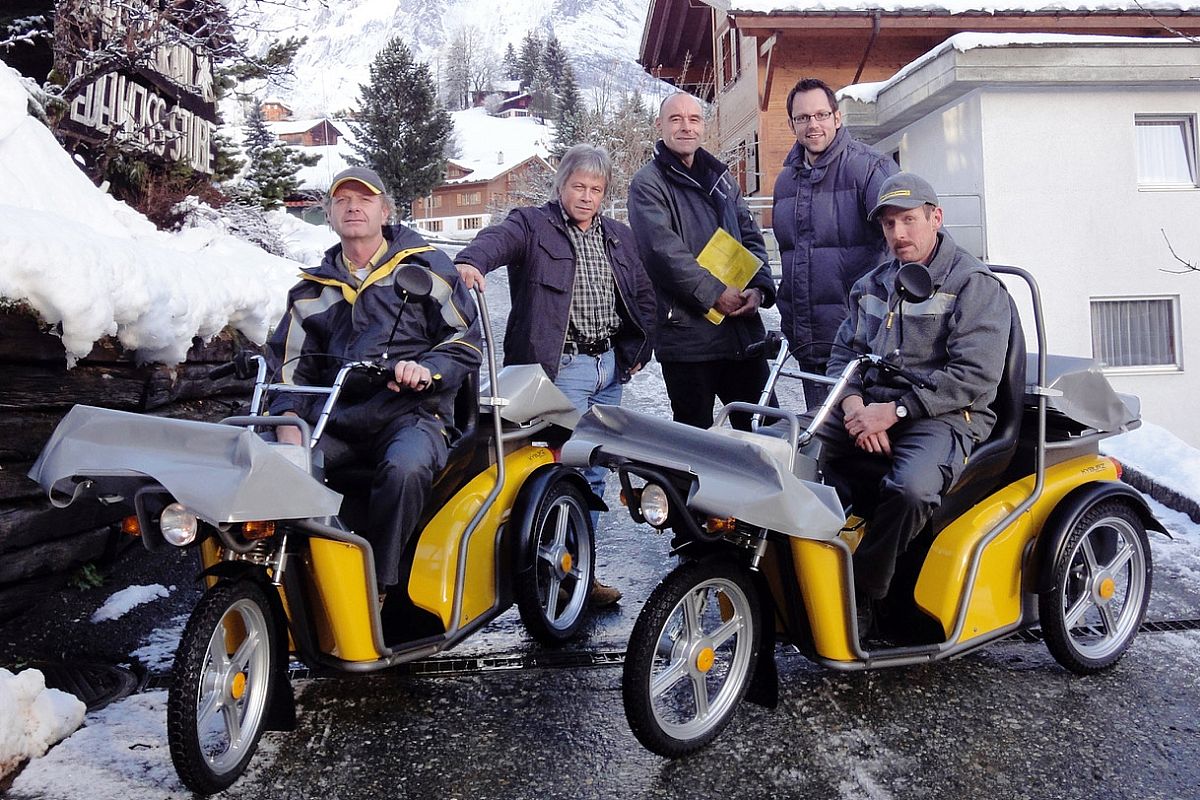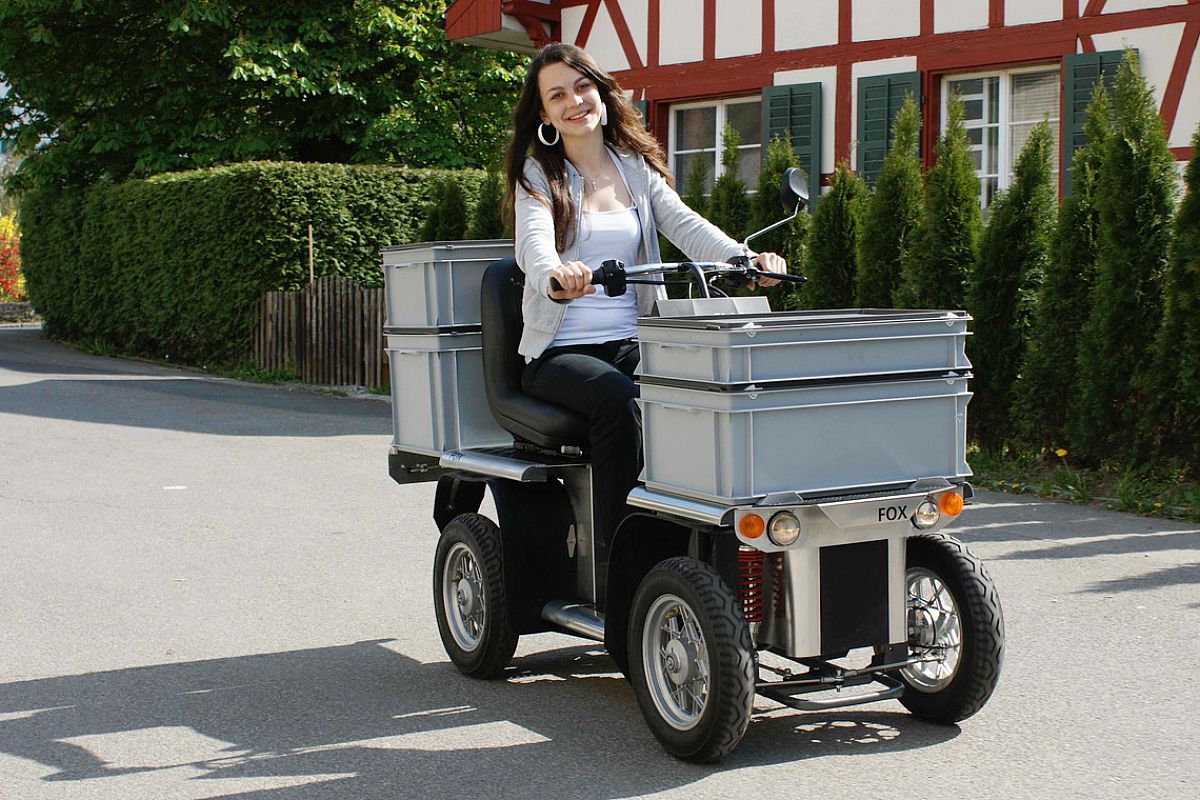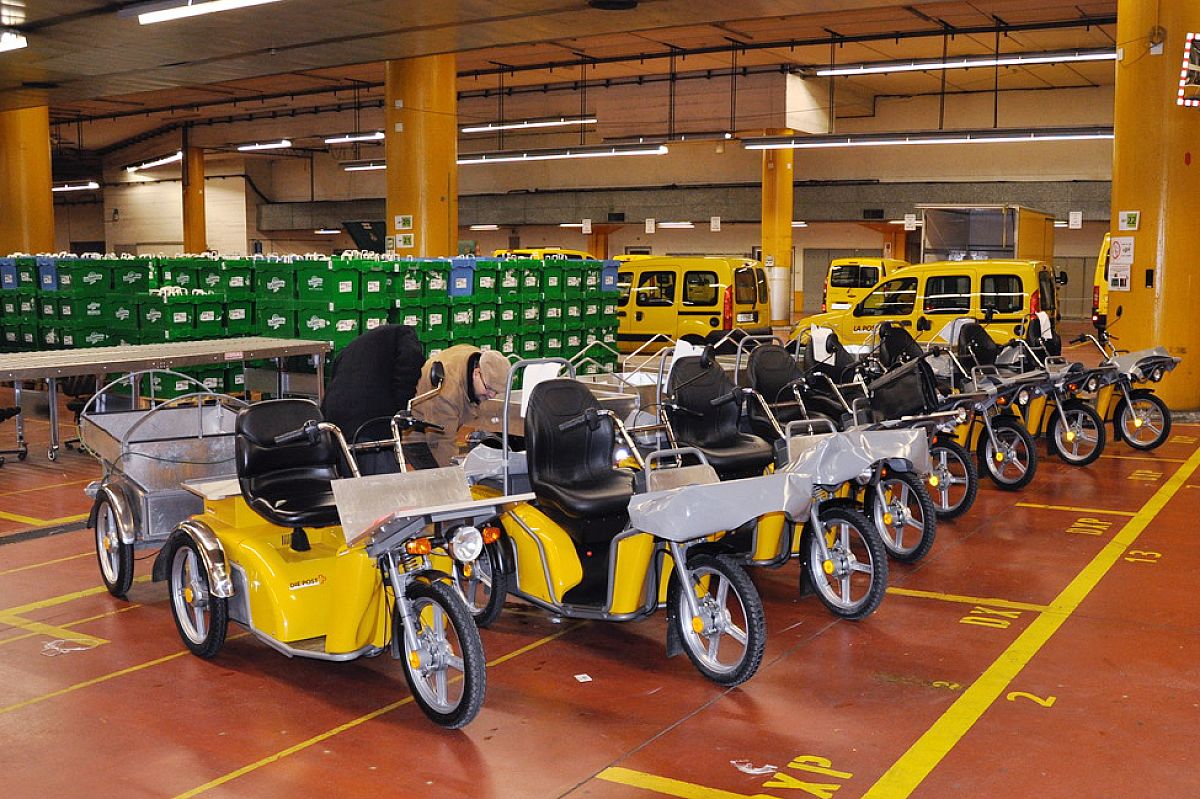Approval: We bring about a change in the law

In the meantime, the first order from Swiss Post for 50 DXP was placed with us together with PAH-type trailers. The order was official as long as we could show a type approval. We only had individual approval and the regulations in force did not allow braked trailers for small motorbikes. What now?
Nothing helped: we had to change the registration regulations!
The first thing we did was to make a formal application to FEDRO, which was also rejected on the grounds that this vehicle category did not exist. We had a real problem!
Fortunately, we had met the Federal Councillors a few years earlier on their school trip. I knew from Transport Minister Leuenberger that he was open to new solutions and that he appreciated alternative vehicles. He himself did not own a car, only an electric scooter, which he rarely used. I also knew that some of the federal councillors had answered us personally because we had sent them a bottle of wine after the visit. So it was possible to communicate with them.
Francesco heard a speech on the radio by the President of the Confederation, Rudolf Merz, on 1 August, in which he praised the innovative strength and economic power of our country.
Francesco and I started writing a letter to Moritz Leuenberger. In the letter, we explained how our vehicles would contribute significantly to safety, how they would save an enormous amount of CO2, but how the project could only be implemented if a change in Swiss road traffic regulations was initiated. It was precisely this request that had been rejected by FEDRO and we were asking them to reconsider the application.
In my absence, Francesco knew no better than to send the same personal request to the head of the Department of Environment and Transport, Doris Leuthard, and to the President of the Swiss Confederation, Rudolf Merz.
All three requests ended up on the desk of Mr Leuenberger, who wrote to us that FEDRO was certainly doing its job correctly and that he would instruct them to look into our request again.
We were given a new contact person at FEDRO. The cooperation was excellent and very benevolent. After three months we had an extraordinary approval for our trailer in our hands and a year later the approval law was changed. After it was all over, the registration officer told us: they were going totally crazy. Within the same week, three federal councillors had been personally informed about the matter. There had never been anything like it in history.
The way was finally clear: We could register the DXP with the trailer in Switzerland and put it into circulation.
Thus, the first order for 50 DXP and PAH also became official and we could finally rejoice. Of course, the very first vehicles had to go into service in Grindelwald and this had to be done before the next winter. The DXP proved themselves very well and they were used all over Switzerland. We delivered many of them personally to the postmen. Everywhere we received suggestions and explained how to use our products. We met with a lot of goodwill.
However, further discussions with Post Company Car, the company that bought our vehicles and sold them to customers, were difficult. We haggled, negotiated, demanded a concept for production implementation and also a service concept. Prices were obtained and suppliers were examined. A lot of things were negotiated. Every fortnight I had a meeting in Bern and each time a mountain of documents was demanded. The tone was sometimes rough and marked by tough negotiations. At that time, Carmen Krauer, our current administrative manager, was in training. She helped me to prepare all the studies and to move the concepts forward. If we didn't quite come to grips with the Post's brief, I simply invited her to come to Berne with me. That way we could prepare even further for the negotiations on the trip. Carmen was always allowed to carry my overweight briefcase and when she sat at the negotiating table with me, the tone of the negotiations was a bit more moderate than when I sat alone at the table - a nice side effect.

One day I got a call: I should get ready for the final hearing. I went to the meeting expectantly together with Peter Glanzmann, who supported me very well in the meantime. I was to prepare for an order of 50 pcs, 100 pcs and 500 pcs. I arrived in Bern and was given an exceptionally courteous welcome. The purchasing manager himself served me a coffee. We sat in the most beautiful meeting room. He was very positive about the progress of the project and assured me: "Today we will get down to business." Full of tension, I entered the meeting room. There was also a minute-taker and together we went through all the individual part prices of the vehicle. I had to estimate what I, as a very shrewd engineer and buyer, could still get out of my suppliers if they would just hypothetically conclude a framework agreement of 1,000 or even 3,000 vehicles. They had checked carefully: Since there was no comparable product and we were the only ones who had a special licence to operate our trailers, they were allowed to conclude a contract with us directly. Due to the lack of alternatives, they did not have to go through a tendering process when placing the order. So I estimated that with this quantity I could certainly optimise 5 to 7% in production costs. Now something completely unexpected happened: He offered me to conclude a framework agreement for 3,000 units if I would reduce the price by another 10%. It was my decision and I had a maximum of 15 minutes! It was a very tough 15 minutes. Together with Peter, we came to the conclusion that we wanted to take on the challenge and accepted the order. In retrospect, I had to sum up that our negotiating partner at the post office had really negotiated very well. I paid him respect and admitted to myself that I still had a lot to learn.
We left the building overjoyed. We actually had our first big contract in our hands. Exactly one year after Peter had joined us, we had won this contract. Over a good lunch we celebrated the success together with Francesco. In the afternoon we started to think about how we could realise the contract.

I learned from this:
- Persistence brings roses.
- I can still learn from a real negotiation professional.
- Celebrating after a successful project is important. After that, the work begins.
